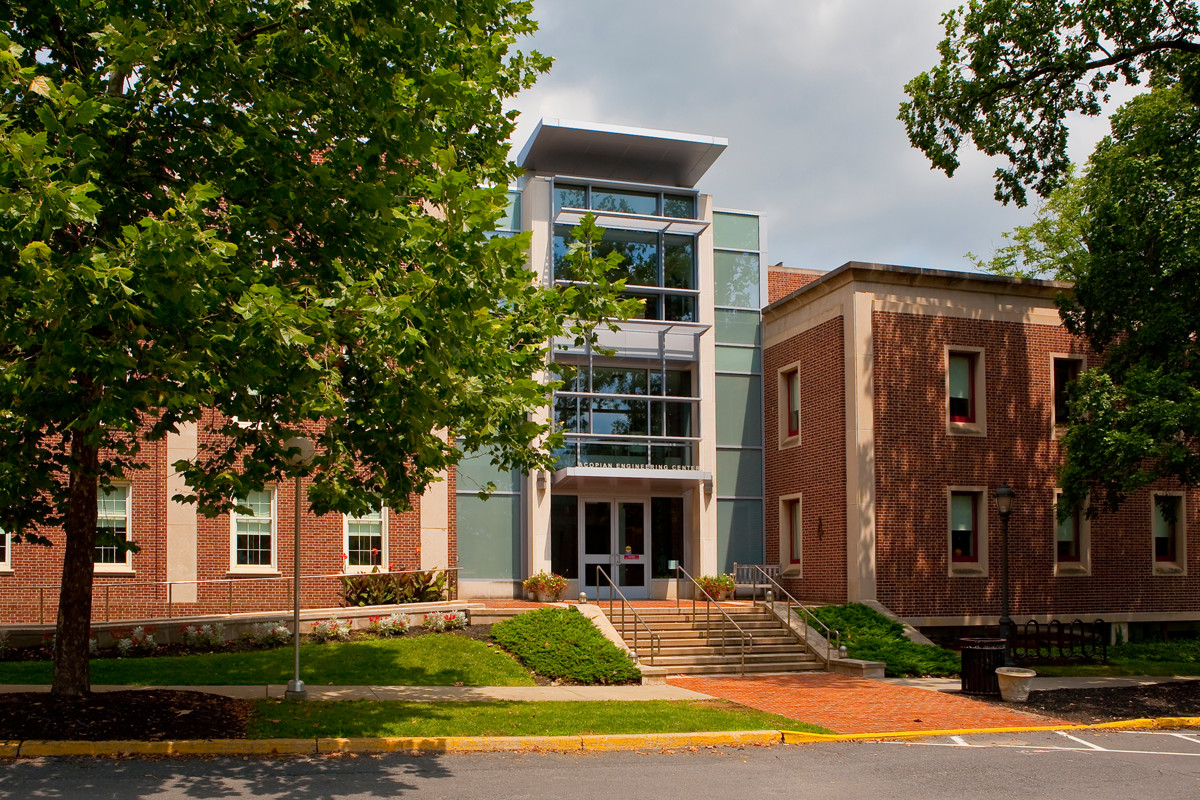CE Facilities
Acopian Engineering Center was renovated in 2003 and houses all the engineering departments. The 90,000 square-foot, five-story structure houses the civil engineering department on the first and third floors.

In addition to a dedicated computer laboratory for civil engineering majors, facilities include laboratories for structural systems, testing of materials, water resources, geotechnical engineering, environmental analysis, geographical information systems (GIS), and environmental engineering.
Geotechnical Lab
Room 100. All structures, including buildings, bridges, dams, pipelines, highways, etc., have foundations in soil and/or rock. In addition, the movement of groundwater and contaminants in the subsurface (an important consideration in environmental engineering studies) is a function of the soil/rock type and structure. It is therefore important that all civil and environmental engineers have a background in the nature and behavior of soil materials so that they can understand and communicate information concerning the relative merits and problems associated with different soil/rock conditions. The geotechnical laboratory has equipment for both educational and research purposes. Equipment is available for the engineering classification of soil, studying the compaction properties of soil-fill material, and measuring the permeability, compressibility, and strength of soils. In addition, a 112-electrode resistivity system is available for using in conducting site investigations.
Fluid Mechanics Lab
Room 101. In this laboratory, we test the theoretical principles and empirical equations of hydraulics at the bench-top and prototype scale. The fluids lab is equipped with flumes, pumps, piping, and tanks to give students hands-on experience with flow of water through a range of different conditions.
Geo-Spatial and Visualization Laboratory
Room 109. This room contains four dual-monitor engineering computers for use in GIS and CAD-related projects.
Structural Lab
Room 111. The structures lab is the place where students fabricate structures, particularly in structural steel. It is a complete steel fabrication shop that includes six welding tables, four welding machines, a Marvel tilt-frame bandsaw, along multiple drillpresses, and a wide variety of handheld powertools. The lab is used extensively in the fall semester for the CE311 Steel Bridge Competition. In both fall and spring semesters, it is used by the Lafayette Steel Bridge Team.
Structural Computing Lab
Room 116. Four computer workstations with dual flat-screen monitors are strategically located across the hall from the two structures labs, to enable students close contact among the areas of computer-aided design, fabrication, and testing.
Lafayette College Concrete Laboratory (LCCL)
Room 117. The Lafayette College Concrete Laboratory (LCCL) is the primary place where students test structural components and scale models. The lab consists of a structural strong-floor; a newly-constructed load-test frame; servo-hydraulic and manual hydraulic actuators for a variety of strong-floor tests; and four, manual-universal test machines. The facility includes a 10 cubic foot concrete mixer.
Environmental Lab
Rooms 117B/104. This lab is used in the Introduction to Environmental Engineering (CE 321) course, as well as upper-level electives such as Water Quality, Water Supply and Pollution Control, and Environmental Site Assessment. Together these courses focus on the assessment of environmental pollution and various methods of treatment. In CE 321, we take a “watershed approach” to a variety of point and nonpoint source issues (as is now common in practice), where environmental problems are viewed within the larger context of the watershed. In particular, we focus on assessment of environmental quality and sources of pollution in the Bushkill Creek Watershed adjacent to campus. This involves lab and field-testing, along with field trips to sites of environmental significance throughout the watershed and Easton.
Computer Lab
Room 302. The Civil and Environmental Computer Lab contains 16 computers with dual, tilting-flat panel monitors. Appropriate specialized software, such as current versions of GIS, AutoCAD, are installed on each computer. Computers are accessible to all students and can be used all hours the building is open.
Civil Student Learning Center
This room is a work area and lounge for the civil engineering students. There are four computers that can run all engineering programs, a large conference work table, and a relaxing sofa/chair set. The room is used as a meeting place as well as a room for group work.